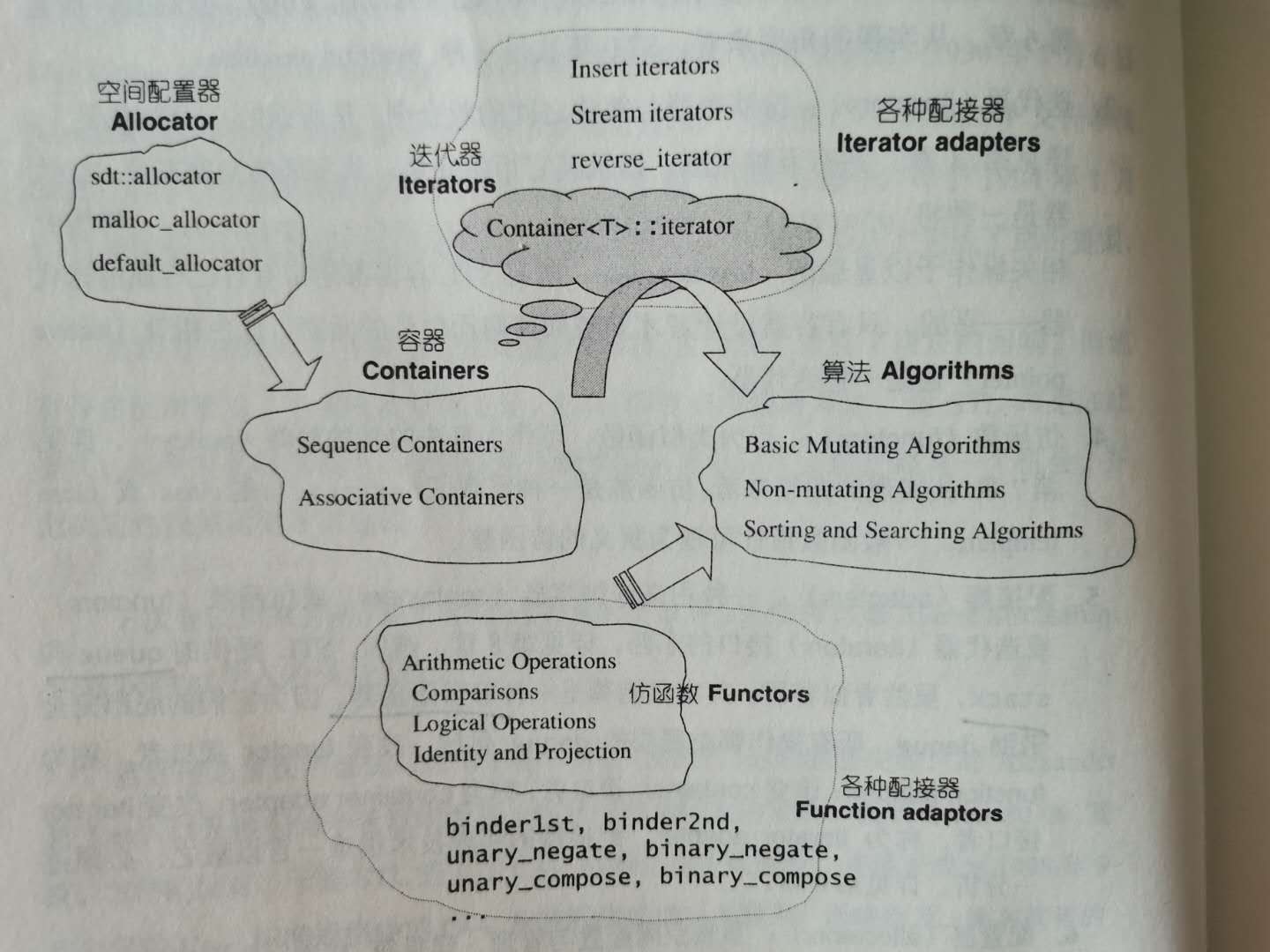第一章:STL概论和版本简介
STL概述
软件界一直期望建立一种可重复运用的方法,使得工程师、程序员不必困于重复编写前人已经编写过的源码,STL应运而生。它建立了数据结构和算法的一套标准,且各组件之间低耦合、独立性高。STL所实现的,是依据泛型思维架设起来的一个概念结构,这个以抽象概念为主题而非以实际类为主体的结构,形成了一个严谨的接口标准,在此接口下,任何组件都有最大的独立性,并以所谓迭代器胶合起来,或以所谓适配器互相配接,或以所谓仿函数动态选择某种策略。
STL提供了六大组件,彼此可以组合套用:
- 容器(containers):各种数据结构,如:vector、list、deque、set、map,主要用来存放数据。
- 算法 (algorithms):各种常见算法,如:sort、search、copy、erase......
- 迭代器 (iterators):扮演算法和容器中的胶合剂,是“泛型指针”。所有STL容器均有自己专属的迭代器。
- 仿函数 (functors):行为类似函数,可作为算法的某种策略。仿函数是一种重载了operator()的class或class template。
- 配接器(adapters): 修饰容器、仿函数、迭代器接口的东西。
- 配置器(allocators):负责空间配置和管理,配置器是一个实现了动态空间配置、空间管理、空间释放的class template.
STL六大组件的交互关系

Container通过Allocator取得数据储存空间,Algorithm通过Iterator存取Container内容,Functor可以协助Algorithm完成不同的策略变化,Adapter可以修饰或套接Functor。
stl_config.h中的各种组态
组态: __STL_STATIC_TEMPLATE_MEMBER_BUG
// file: 1config3.cpp
// 测试在 class template中 拥有 static data members.
// test __STL_STATIC_TEMPLATE_MEMBER_BUG, defined in <stl_config.h>
// ref. C++ Primer 3/e, p.839
// vc6[o] cb4[x] gcc[o]
// cb4 does not support static data member initialization.
// 如果编译器无法处理static member of template classes(模板类静态成员)就定义。
// 即对于模板类中,模板类型不同时的静态变量不同。
#include <iostream>
using namespace std;
template <typename T>
class TestClass {
public:
static int _data;
};
// 需要加上template<>,否则编译出错,进行内存配置
template<> int TestClass<int>::_data = 1;
template<> int TestClass<char>::_data = 1;
int main() {
cout << TestClass<int>::_data << endl;
cout << TestClass<char>::_data << endl;
TestClass<int> obji1, obji2;
TestClass<char> objc1, objc2;
cout << obji1._data << " " << obji2._data << endl;
cout << objc1._data << " " << objc2._data << endl;
obji1._data = 3;
objc2._data = 4;
cout << obji1._data << " " << obji2._data << endl;
cout << objc1._data << " " << objc2._data << endl;
}
1
2
3
4
5
6
7
8
9
10
11
12
13
14
15
16
17
18
19
20
21
22
23
24
25
26
27
28
29
30
31
32
33
34
35
36
37
38
39
2
3
4
5
6
7
8
9
10
11
12
13
14
15
16
17
18
19
20
21
22
23
24
25
26
27
28
29
30
31
32
33
34
35
36
37
38
39
组态:__STL_CLASS_PARTIAL_SPECIALIZATION
// file: 1config5.cpp
// 测试 class template partial specialization
// — 在 class template的一般化设计之外,特别针对某些 template参数做特殊设计。
// test __STL_CLASS_PARTIAL_SPECIALIZATION in <stl_config.h>
// ref. C++ Primer 3/e, p.860
// vc6[x] cb4[o] gcc[o]
// 如果编译器支持 partial specialization of class templates(模板类偏特化)就定义。
// 在模板类一般化设计之外(全特化),针对某些template做特殊设计。
// “所谓的partial specialization的另一个意思是提供另一份template定义式,而其本身仍是templatized”
// 全特化就是所有的模板都为具体的类。
// T* 特化允许用指针类型匹配的模式(也只能匹配指针类型)。
// const T* 特化允许使用指向const的指针 类型匹配(也只能匹配指向const的指针)。
#include <iostream>
using namespace std;
// 一般化设计
template <class I, class O>
struct TestClass {
TestClass() {
cout << "I, O" << endl;
}
};
// 特殊化设计
template <class T>
struct TestClass<T*, T*> {
TestClass() {
cout << "T*, T*" << endl;
}
};
// 特殊化设计
template <class T>
struct TestClass<const T*, T*> {
TestClass() {
cout << "const T*, T*" << endl;
}
};
int main() {
TestClass<int, char> obj1;
TestClass<int *, int *> obj2;
TestClass<const int *, int *> obj3;
}
1
2
3
4
5
6
7
8
9
10
11
12
13
14
15
16
17
18
19
20
21
22
23
24
25
26
27
28
29
30
31
32
33
34
35
36
37
38
39
40
41
42
43
44
45
46
2
3
4
5
6
7
8
9
10
11
12
13
14
15
16
17
18
19
20
21
22
23
24
25
26
27
28
29
30
31
32
33
34
35
36
37
38
39
40
41
42
43
44
45
46
组态:__STL_MEMBER_TEMPLATES
// file: 1config8.cpp
// 测试 class template之内可否再有 template (members).
// test __STL_MEMBER_TEMPLATES in <stl_config.h>
// ref. C++ Primer 3/e, p.844
// vc6[o] cb4[o] gcc[o]
// 如果编译器支持template members of classes(模板类内嵌套模板) 就定义。
#include <iostream>
using namespace std;
class alloc {
};
template <class T, class Alloc=alloc>
class vec {
public:
typedef T value_type;
typedef value_type* iterator; // 迭代器为指针
// typedef T *iterator; // 直接定义也可
template <class I> // 模板嵌套模板
void insert(iterator position, I first, I last) {
cout << "insert()" << endl;
}
};
int main() {
int ia[5] = {0, 1, 2, 3, 4};
vec<int> x;
vec<int>::iterator ite;
x.insert(ite, ia, ia + 5);
}
1
2
3
4
5
6
7
8
9
10
11
12
13
14
15
16
17
18
19
20
21
22
23
24
25
26
27
28
29
30
31
32
33
34
2
3
4
5
6
7
8
9
10
11
12
13
14
15
16
17
18
19
20
21
22
23
24
25
26
27
28
29
30
31
32
33
34
组态:__STL_LIMITED_DEFAULT_TEMPLATES
// file: 1config10.cpp
// 测试 template参数可否根据前㆒个 template参数而设定默认值。
// test __STL_LIMITED_DEFAULT_TEMPLATES in <stl_config.h>
// ref. C++ Primer 3/e, p.816
// vc6[o] cb4[o] gcc[o]
// 如果编译器支持一个template参数可以根据前一个template的参数设置就定义。
#include <iostream>
#include <cstddef> // for size_t
using namespace std;
class alloc {
};
template <class T, class Alloc=alloc, size_t BufSiz=0>
class deque {
public:
deque() {
cout << "deque()" << endl;
}
};
template <class T, class Sequence = deque<T>>
class stack {
public:
stack() {
cout << "stack" << endl;
}
private:
Sequence c;
};
int main() {
stack<int> x;
}
1
2
3
4
5
6
7
8
9
10
11
12
13
14
15
16
17
18
19
20
21
22
23
24
25
26
27
28
29
30
31
32
33
34
35
36
2
3
4
5
6
7
8
9
10
11
12
13
14
15
16
17
18
19
20
21
22
23
24
25
26
27
28
29
30
31
32
33
34
35
36
← 第七章:模板与泛型编程 第二章:空间配置器 →